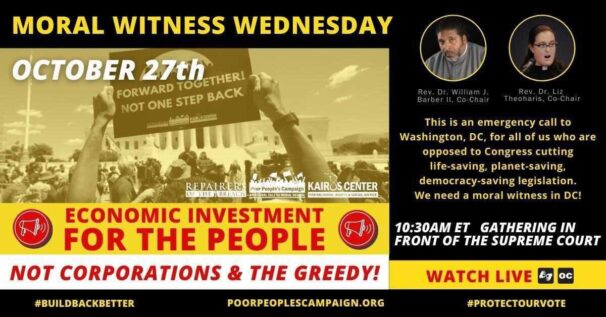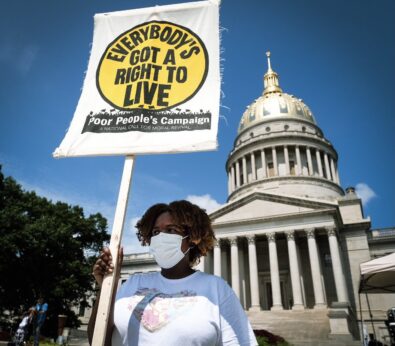
CHARLESTON, W. VA.—With key votes looming before Halloween on Democratic President Joe Biden’s Build Back Better legislative package, the Poor People’s Campaign—brandishing data showing the poor’s electoral impact around the U.S.—stepped up pressure on the two recalcitrant Senate Democrats blocking BBB’s way, Krysten Sinema of Arizona and Joe Manchin of West Virginia.
Their latest events were a demonstration on Oct. 22 in Arizona and yet another car caravan, rally, and prayer vigil in Charleston, W. Va., three days later.
“We’ve been calling on Joe Biden and (Vice President) Kamala Harris to go to West Virginia and go to Arizona and talk to people,” Poor People’s Campaign Co-Chair The Rev. Liz Theoharis says. “The vast majority of people, “across party lines and across political lines, are supportive of these programs” in the BBB bill.
The programs include making the child care tax credit permanent along with paid family and medical leave, expanding Medicare to cover dental, vision, and hearing care, investing more in housing and education, comprehensive pro-worker labor law reform and immigration reform, and—to pay for it all—raising taxes on corporations and the 1% while cutting the military budget in half.
The capitalist class strongly opposes the BBB bill, not so much because of the programs, even though right-wing ideological groups hate those, but because of BBB’s tax hikes on corporations and the rich.
And that same class has been funding Manchin, Sinema, and other so-called Democratic “moderates.”
“Senators are compromising, so we intend to keep putting the pressure on Manchin, Sinema, and Chuck Schumer,” the Democratic leader, “using the power of the people,” Theoharis adds. The Poor People’s Campaign wants Schumer to hold fast to the original 10-year BBB bill and its programs and demands the two senators drop their sabotage of key pieces of the agenda.
The BBB bill is one of the two big Biden bills scheduled for congressional votes in the week through Halloween. “Hard” infrastructure, such as replacing creaky subways, replacing collapsing bridges, resurfacing crumbling funds, protecting the electric grid, and funding mass transit and highways, is the other. If Biden compromises too far on the social programs legislation, the 96-member Congressional Progressive Caucus threatens to walk.
The Arizona and West Virginia events followed the publication of a study of voting, showing that poor and low-income voters accounted for 35% of the 168 million ballots in the 2020 election. That included half of all voters in West Virginia, the state with the second-lowest median income in the U.S., and 39.96% of all Arizonan voters.
And the plurality of those poor and low-income voters were white, indicating the potential of a political coalition that crosses racial lines, even in a deeply divided country.
“Poor and low-income voters are the sleeping giant that could shift the kind of politics and the outcome of our politics in this country,” said Poor People’s Campaign co-chair the Rev. William Barber, using the title of the study, available on the PPC’s website.
“It’s a myth that they’re tired and discouraged,” he said in a mid-month press conference, discussing the common assumption that the poor and low-income people don’t vote. “That obscures the need to solve the problems they face.
 “We are working in the Poor People’s Campaign to be a movement that registers people to vote…. We are building power, as well as shifting the narrative,” he said. Added Theoharis: “We’ll continue to target those states where they”—poor and low-income voters—“can have the most impact.”
“We are working in the Poor People’s Campaign to be a movement that registers people to vote…. We are building power, as well as shifting the narrative,” he said. Added Theoharis: “We’ll continue to target those states where they”—poor and low-income voters—“can have the most impact.”
Targeting or not, it’s going to take a lot of shifting. Both Manchin and Sinema are raising scads of campaign cash from the capitalist class and its campaign finance committees (PACs) even though they don’t face the voters until 2024. (Manchin has sometimes flirted with running for governor—again—in 2022.)
“Manchin could go down in history as a great and caring senator,” Barber said before the latest car caravan to Charleston. “But his actions are making him a greedy, callous senator.” Among other cost-cutting ideas Manchin has floated to trim the price tag of the BBB plan: Means-testing its benefits and eliminating free community college tuition. Biden has yielded to Manchin on that.
Charleston pastor David Fryson said of Manchin: “It would be somewhat unfortunate that at the end of his political career, he would allow himself to be used by the corporate structure… I’d hate for his legacy to be a person like George Wallace who stood in the schoolhouse door” to bar Black Americans from enrolling at the University of Alabama in 1962.
What Fryson didn’t say was that at the end of his career, in his last gubernatorial term, segregationist Wallace repudiated his former racial views.
“We keep hearing dog whistles out of Washington, D.C.,” added West Virginia PPC co-chair Pam Garrison, who, like 89% of West Virginians, is white. “’Socialism’ they say of a bill that will help people. ‘Entitlements,’ they say. Well, we don’t need just a crumble. I’m tired of being let down, and I’m tired of the spin.”
“Many of us older folks retire and return” to West Virginia because of what used to be lower prices,” said 81-year-old great grandmother Jean Evansmore. “We pay taxes and we vote.
“We put you into office,” she said, addressing the absent Manchin. “And we’ll work hard to make sure you don’t put the screws to anyone anymore.
“I voted for him before, because he was the lesser of two evils,” she conceded. “No, I will not support him again and I’ll be damn sure he’ll not go any farther.”
But Kaylen Marie Parker, a ninth-generation West Virginian who’s still trying to struggle out of poverty despite holding a master’s degree, injected a note of political pessimism: “The West Virginia Democratic Party never gives us a choice,” she said. “It’s either Joe Manchin or Patrick Morrissey,” the senator’s GOP foe in 2018, who lost by 3%. Morrissey “would have been an even bigger disaster.”
She also criticized the top bargainer with Manchin, Biden, “for radio silence to the people of West Virginia.”
The senators appear to be listening to their corporate campaign contributors, not their constituents, and especially not to their poor and low-income constituents.

Sinema opposes both the corporate tax increases in Biden’s BBB plan and its higher taxes on the rich. Manchin, the Senate Energy Committee chair, opposes key clean air sections designed to curb the burning of fossil fuels—coal, oil, and natural gas—which contribute to global warming.
Sinema’s stand drew a pointed critique from PPC Research Director Sarah Anderson. Biden’s tax hikes, Anderson noted, would hit only the richest 0.3% of U.S. taxpayers including, though she did not say so, incumbent West Virginia GOP Gov. Jim Justice.
“Are we going to pursue a more equitable path or let so many resources flow to those at the very top?” she asked.
OpenSecrets.org reports that Manchin is all-time #1 while in office when it comes to coal mine company contributions, though those have been declining—along with the industry—in recent election cycles. But in his latest haul, for the 2021-22 cycle through Sept. 30, oil, natural gas, and pipeline companies top his list, with just over $240,000, from corporate campaign finance committees, or PACs. Coal and other mining interests are now far behind ($55,000).
From when Sinema first ran for Congress almost a decade ago through this past July, retirees have been her most generous supporters ($2.9 million). That’s no surprise given the Grand Canyon State’s reputation as a retirement haven, but it’s a category that hides the economic sectors donors hail from.
Following them are lawyers and law firms ($2.4 million), Wall Street and other investment companies ($2.2 million), and financial, insurance, and real estate ($116,000). Except for the retirees, who are overwhelmingly individuals, the contributions have mostly come from corporate political action committees.










